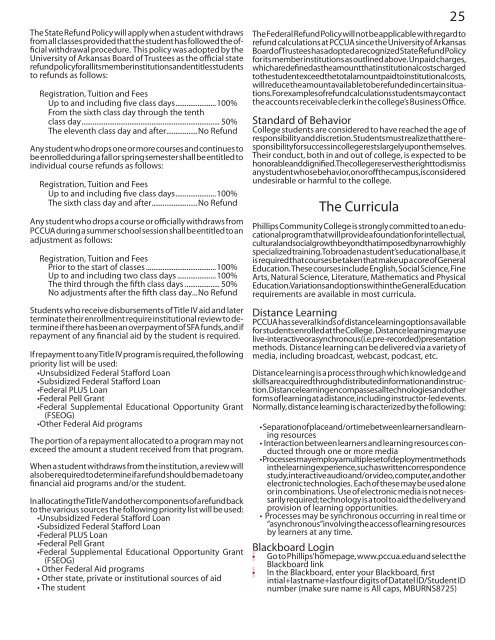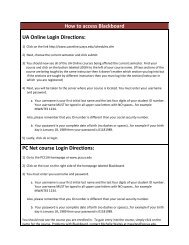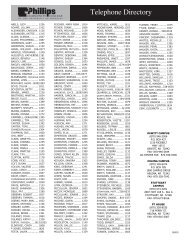College Catalog 2009-2010 PDF - Phillips Community College
College Catalog 2009-2010 PDF - Phillips Community College
College Catalog 2009-2010 PDF - Phillips Community College
Create successful ePaper yourself
Turn your PDF publications into a flip-book with our unique Google optimized e-Paper software.
The State Refund Policy will apply when a student withdraws<br />
from all classes provided that the student has followed the official<br />
withdrawal procedure. This policy was adopted by the<br />
University of Arkansas Board of Trustees as the official state<br />
refund policy for all its member institutions and entitles students<br />
to refunds as follows:<br />
Registration, Tuition and Fees<br />
Up to and including five class days ......................100%<br />
From the sixth class day through the tenth<br />
class day ........................................................................... 50%<br />
The eleventh class day and after .................No Refund<br />
Any student who drops one or more courses and continues to<br />
be enrolled during a fall or spring semester shall be entitled to<br />
individual course refunds as follows:<br />
Registration, Tuition and Fees<br />
Up to and including five class days ......................100%<br />
The sixth class day and after .........................No Refund<br />
Any student who drops a course or officially withdraws from<br />
PCCUA during a summer school session shall be entitled to an<br />
adjustment as follows:<br />
Registration, Tuition and Fees<br />
Prior to the start of classes ......................................100%<br />
Up to and including two class days .....................100%<br />
The third through the fifth class days ................... 50%<br />
No adjustments after the fifth class day ...No Refund<br />
Students who receive disbursements of Title IV aid and later<br />
terminate their enrollment require institutional review to determine<br />
if there has been an overpayment of SFA funds, and if<br />
repayment of any financial aid by the student is required.<br />
If repayment to any Title IV program is required, the following<br />
priority list will be used:<br />
•Unsubsidized Federal Stafford Loan<br />
•Subsidized Federal Stafford Loan<br />
•Federal PLUS Loan<br />
•Federal Pell Grant<br />
•Federal Supplemental Educational Opportunity Grant<br />
(FSEOG)<br />
•Other Federal Aid programs<br />
The portion of a repayment allocated to a program may not<br />
exceed the amount a student received from that program.<br />
When a student withdraws from the institution, a review will<br />
also be required to determine if a refund should be made to any<br />
financial aid programs and/or the student.<br />
In allocating the Title IV and other components of a refund back<br />
to the various sources the following priority list will be used:<br />
•Unsubsidized Federal Stafford Loan<br />
•Subsidized Federal Stafford Loan<br />
•Federal PLUS Loan<br />
•Federal Pell Grant<br />
•Federal Supplemental Educational Opportunity Grant<br />
(FSEOG)<br />
• Other Federal Aid programs<br />
• Other state, private or institutional sources of aid<br />
• The student<br />
25<br />
The Federal Refund Policy will not be applicable with regard to<br />
refund calculations at PCCUA since the University of Arkansas<br />
Board of Trustees has adopted a recognized State Refund Policy<br />
for its member institutions as outlined above. Unpaid charges,<br />
which are defined as the amount that institutional costs charged<br />
to the student exceed the total amount paid to institutional costs,<br />
will reduce the amount available to be refunded in certain situations.<br />
For examples of refund calculations students may contact<br />
the accounts receivable clerk in the college’s Business Office.<br />
Standard of Behavior<br />
<strong>College</strong> students are considered to have reached the age of<br />
responsibility and discretion. Students must realize that the responsibility<br />
for success in college rests largely upon themselves.<br />
Their conduct, both in and out of college, is expected to be<br />
honorable and dignified. The college reserves the right to dismiss<br />
any student whose behavior, on or off the campus, is considered<br />
undesirable or harmful to the college.<br />
The Curricula<br />
<strong>Phillips</strong> <strong>Community</strong> <strong>College</strong> is strongly committed to an educational<br />
program that will provide a foundation for intellectual,<br />
cultural and social growth beyond that imposed by narrow highly<br />
specialized training. To broaden a student’s educational base, it<br />
is required that courses be taken that make up a core of General<br />
Education. These courses include English, Social Science, Fine<br />
Arts, Natural Science, Literature, Mathematics and Physical<br />
Education. Variations and options within the General Education<br />
requirements are available in most curricula.<br />
Distance Learning<br />
PCCUA has several kinds of distance learning options available<br />
for students enrolled at the <strong>College</strong>. Distance learning may use<br />
live-interactive or asynchronous (i.e. pre-recorded) presentation<br />
methods. Distance learning can be delivered via a variety of<br />
media, including broadcast, webcast, podcast, etc.<br />
Distance learning is a process through which knowledge and<br />
skills are acquired through distributed information and instruction.<br />
Distance learning encompasses all technologies and other<br />
forms of learning at a distance, including instructor-led events.<br />
Normally, distance learning is characterized by the following:<br />
• Separation of place and/or time between learners and learning<br />
resources<br />
• Interaction between learners and learning resources conducted<br />
through one or more media<br />
• Processes may employ a multiple set of deployment methods<br />
in the learning experience, such as written correspondence<br />
study, interactive audio and/or video, computer, and other<br />
electronic technologies. Each of these may be used alone<br />
or in combinations. Use of electronic media is not necessarily<br />
required; technology is a tool to aid the delivery and<br />
provision of learning opportunities.<br />
• Processes may be synchronous occurring in real time or<br />
“asynchronous” involving the access of learning resources<br />
by learners at any time.<br />
Blackboard Login<br />
•<br />
•<br />
Go to <strong>Phillips</strong>’ homepage, www.pccua.edu and select the<br />
Blackboard link<br />
In the Blackboard, enter your Blackboard, first<br />
intial+lastname+lastfour digits of Datatel ID/Student ID<br />
number (make sure name is All caps, MBURNS8725)




